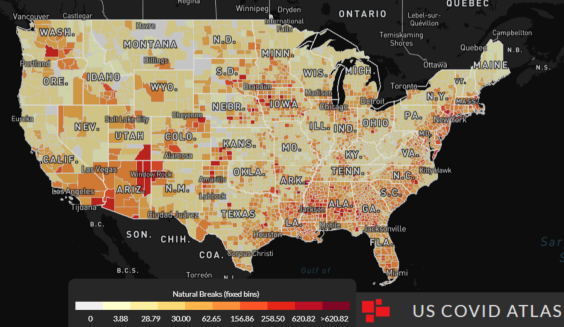COVID-19: Response and Recovery Work
The coronavirus epidemic has widened existing social, geographic, and economic inequities in communities across the country.
While the County Health Rankings do not measure coronavirus cases nor rank risk of the virus spreading in communities, Rankings data are helpful in providing local context on factors that impact health.
Gaps in health persist by place and race. These gaps are due to a long legacy of American policies, practices, systems, and budgets that advantage some people and disadvantage others. Rankings factors such as housing, access to medical care, and unemployment provide a better understanding of community context and the places and people that could be most affected by the coronavirus epidemic.
The Rankings are a call to action about what can be done to improve community conditions so that an inclusive and equitable recovery for all is possible.
Find out more information below on the Rankings’ work related to response and recovery from the COVID-19 pandemic, including a county-level data mapping project in collaboration with the University of Chicago, a special webinar series, featured COVID-19-curated What Works for Health strategies, and community stories.
US COVID Atlas: Partnership with the University of Chicago Center for Spatial Data Science

The University of Chicago Center for Spatial Data Science’s US COVID Atlas tracks near real-time coronavirus data to provide a unique county-level look at how COVID-19 is spreading. With the integration of County Health Rankings measures—including children in poverty, residential segregation, and income inequality—the Atlas also shows how social and economic conditions can impact why some communities are hit harder by the virus than others.
Use the Atlas to:
- Compare near real-time, county-level COVID-19 data;
- See how the virus has spread in communities over time, including seeing both new and more mature hotspots;
- Paint a clearer picture of places—like tribal communities and hypersegregated cities—that share a greater burden of the pandemic; and
- Explore key Rankings measures that provide important context about community conditions that may impact how a community prepares, copes, and recovers from the challenges of COVID-19.
Read our blog and watch the recording of our July 21 webinar to learn more about the Atlas.
Health Equity and Social Solidarity in the Time of Pandemic: Strategies for COVID-19 Response and Recovery Webinar Series
How can we work toward a more inclusive and equitable recovery for all?
To help answer this question, County Health Rankings offered a 5-part webinar series, Health Equity and Social Solidarity in the Time of Pandemic: Strategies for COVID-19 Response and Recovery. This series highlighted the challenges communities are facing as they respond to COVID-19 and its impacts, and served as an opportunity for community leaders across the nation to learn from lead researchers, policymakers and each other.
For a recap of this special webinar series:
Additional COVID-19 Resources
Find helpful resources that community leaders, practitioners, and policymakers can access as they navigate the path to an inclusive and equitable recovery from COVID-19.
What Works for COVID-19 Recovery
Search a list of evidence-informed strategies that help communities respond to and recover from COVID-19. These interventions address income, education, housing, and more based on a framework for pandemic health equity.
Action Learning Guides on Data and Equity
Take action with resources designed to provide communities with the guidance, tools, and examples to develop a deeper understanding of data and the underlying factors that create inequities in communities
Stockton, CA StoryMap
Dive deep into our community story on how Stockton, CA is using a guaranteed income pilot program to address income inequality locally, featuring stories from residents as to how this program has affected life before and after COVID-19.
COVID-19 Resources
Explore trusted resources curated by the University of Wisconsin Population Health Institute to support COVID-19 response and recovery work in your community.
